Master in Nursing: Literature Review on Oral Health & Pneumonia Risk
VerifiedAdded on 2023/06/12
|8
|2006
|163
Literature Review
AI Summary
This literature review investigates the impact of oral hygiene practices on the risk of aspiration pneumonia in elderly patients. It highlights the significance of oral health in preventing this condition, particularly among those with dentures or those receiving long-term care. The review analyzes several research articles that explore the correlation between poor oral hygiene, denture-wearing habits, and the incidence of aspiration pneumonia. It also examines the effectiveness of oral care interventions, such as wiping plus oral nutritional supplements, in reducing mortality risk. The review emphasizes the need for improved oral health programs and education for both elderly patients and their caregivers to enhance oral hygiene practices and mitigate the risk of aspiration pneumonia, ultimately improving the quality of life and reducing mortality rates in this vulnerable population. Desklib provides access to similar solved assignments and past papers for students.
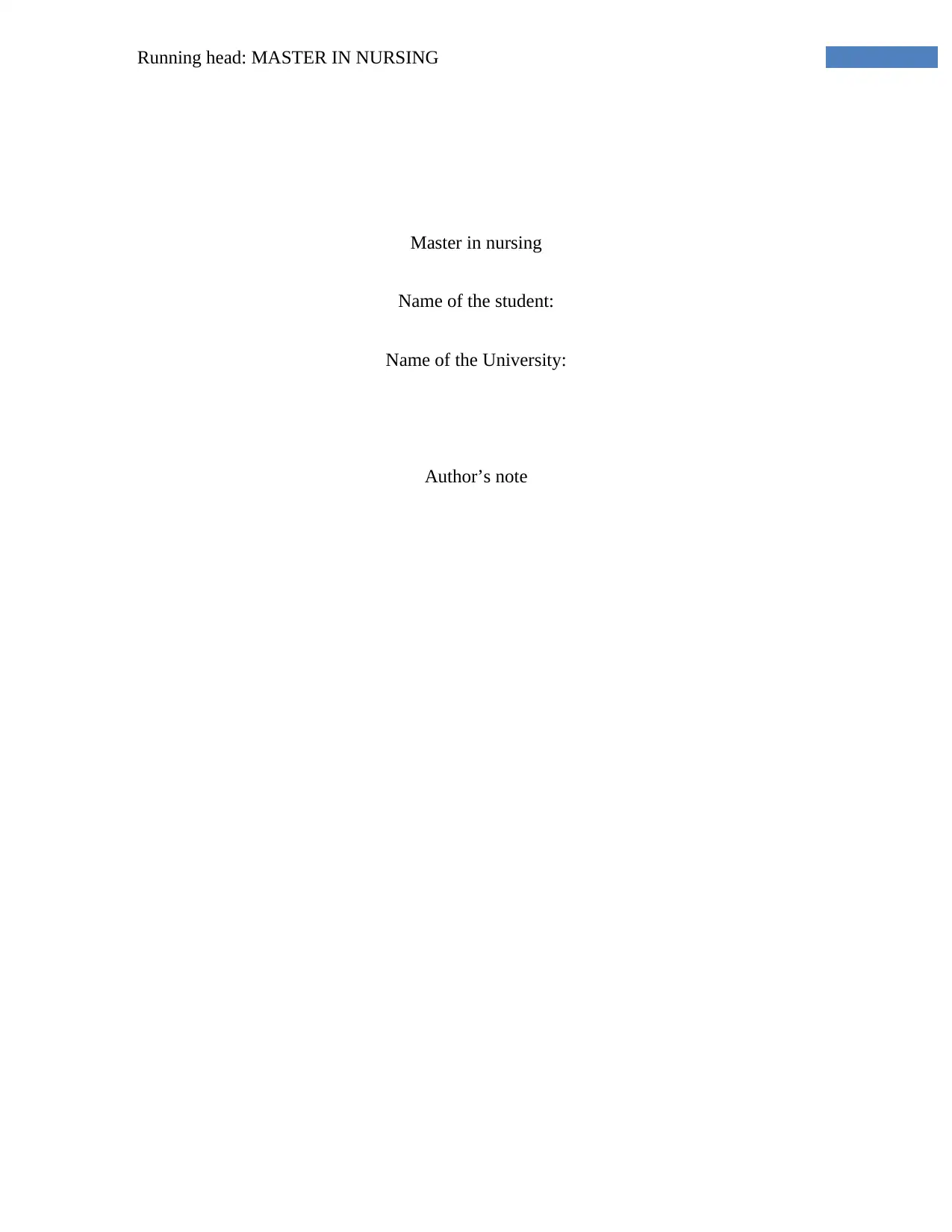
Running head: MASTER IN NURSING
Master in nursing
Name of the student:
Name of the University:
Author’s note
Master in nursing
Name of the student:
Name of the University:
Author’s note
Paraphrase This Document
Need a fresh take? Get an instant paraphrase of this document with our AI Paraphraser
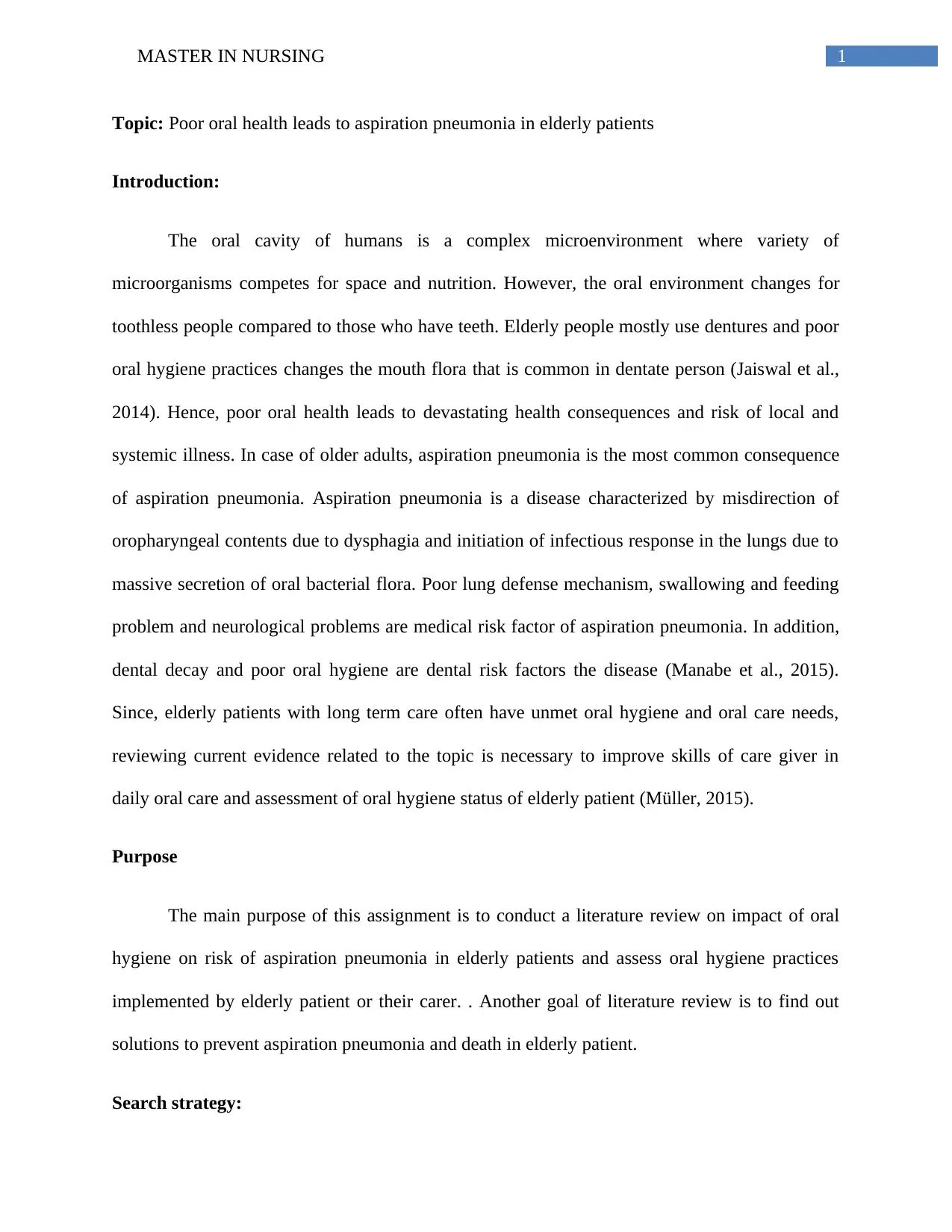
1MASTER IN NURSING
Topic: Poor oral health leads to aspiration pneumonia in elderly patients
Introduction:
The oral cavity of humans is a complex microenvironment where variety of
microorganisms competes for space and nutrition. However, the oral environment changes for
toothless people compared to those who have teeth. Elderly people mostly use dentures and poor
oral hygiene practices changes the mouth flora that is common in dentate person (Jaiswal et al.,
2014). Hence, poor oral health leads to devastating health consequences and risk of local and
systemic illness. In case of older adults, aspiration pneumonia is the most common consequence
of aspiration pneumonia. Aspiration pneumonia is a disease characterized by misdirection of
oropharyngeal contents due to dysphagia and initiation of infectious response in the lungs due to
massive secretion of oral bacterial flora. Poor lung defense mechanism, swallowing and feeding
problem and neurological problems are medical risk factor of aspiration pneumonia. In addition,
dental decay and poor oral hygiene are dental risk factors the disease (Manabe et al., 2015).
Since, elderly patients with long term care often have unmet oral hygiene and oral care needs,
reviewing current evidence related to the topic is necessary to improve skills of care giver in
daily oral care and assessment of oral hygiene status of elderly patient (Müller, 2015).
Purpose
The main purpose of this assignment is to conduct a literature review on impact of oral
hygiene on risk of aspiration pneumonia in elderly patients and assess oral hygiene practices
implemented by elderly patient or their carer. . Another goal of literature review is to find out
solutions to prevent aspiration pneumonia and death in elderly patient.
Search strategy:
Topic: Poor oral health leads to aspiration pneumonia in elderly patients
Introduction:
The oral cavity of humans is a complex microenvironment where variety of
microorganisms competes for space and nutrition. However, the oral environment changes for
toothless people compared to those who have teeth. Elderly people mostly use dentures and poor
oral hygiene practices changes the mouth flora that is common in dentate person (Jaiswal et al.,
2014). Hence, poor oral health leads to devastating health consequences and risk of local and
systemic illness. In case of older adults, aspiration pneumonia is the most common consequence
of aspiration pneumonia. Aspiration pneumonia is a disease characterized by misdirection of
oropharyngeal contents due to dysphagia and initiation of infectious response in the lungs due to
massive secretion of oral bacterial flora. Poor lung defense mechanism, swallowing and feeding
problem and neurological problems are medical risk factor of aspiration pneumonia. In addition,
dental decay and poor oral hygiene are dental risk factors the disease (Manabe et al., 2015).
Since, elderly patients with long term care often have unmet oral hygiene and oral care needs,
reviewing current evidence related to the topic is necessary to improve skills of care giver in
daily oral care and assessment of oral hygiene status of elderly patient (Müller, 2015).
Purpose
The main purpose of this assignment is to conduct a literature review on impact of oral
hygiene on risk of aspiration pneumonia in elderly patients and assess oral hygiene practices
implemented by elderly patient or their carer. . Another goal of literature review is to find out
solutions to prevent aspiration pneumonia and death in elderly patient.
Search strategy:
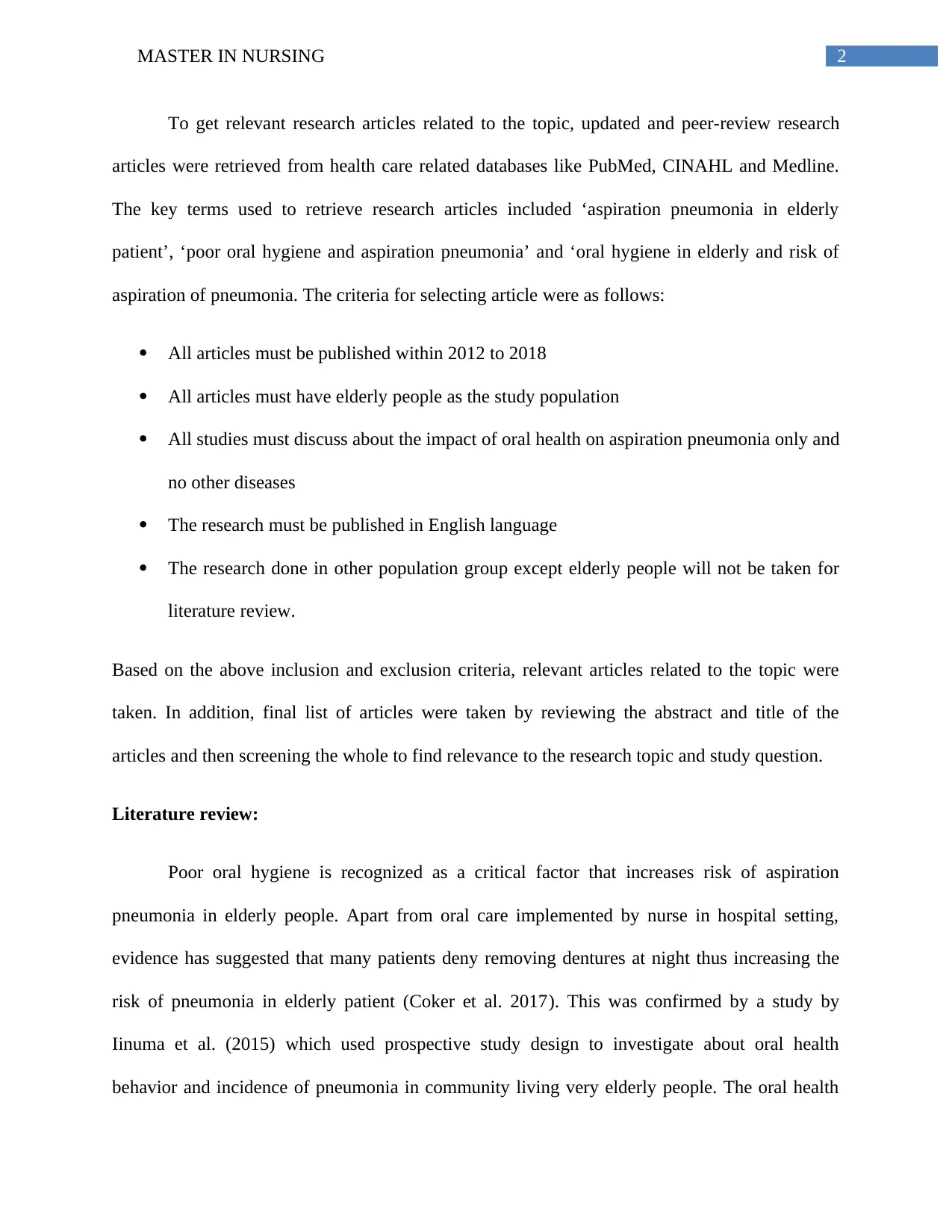
2MASTER IN NURSING
To get relevant research articles related to the topic, updated and peer-review research
articles were retrieved from health care related databases like PubMed, CINAHL and Medline.
The key terms used to retrieve research articles included ‘aspiration pneumonia in elderly
patient’, ‘poor oral hygiene and aspiration pneumonia’ and ‘oral hygiene in elderly and risk of
aspiration of pneumonia. The criteria for selecting article were as follows:
All articles must be published within 2012 to 2018
All articles must have elderly people as the study population
All studies must discuss about the impact of oral health on aspiration pneumonia only and
no other diseases
The research must be published in English language
The research done in other population group except elderly people will not be taken for
literature review.
Based on the above inclusion and exclusion criteria, relevant articles related to the topic were
taken. In addition, final list of articles were taken by reviewing the abstract and title of the
articles and then screening the whole to find relevance to the research topic and study question.
Literature review:
Poor oral hygiene is recognized as a critical factor that increases risk of aspiration
pneumonia in elderly people. Apart from oral care implemented by nurse in hospital setting,
evidence has suggested that many patients deny removing dentures at night thus increasing the
risk of pneumonia in elderly patient (Coker et al. 2017). This was confirmed by a study by
Iinuma et al. (2015) which used prospective study design to investigate about oral health
behavior and incidence of pneumonia in community living very elderly people. The oral health
To get relevant research articles related to the topic, updated and peer-review research
articles were retrieved from health care related databases like PubMed, CINAHL and Medline.
The key terms used to retrieve research articles included ‘aspiration pneumonia in elderly
patient’, ‘poor oral hygiene and aspiration pneumonia’ and ‘oral hygiene in elderly and risk of
aspiration of pneumonia. The criteria for selecting article were as follows:
All articles must be published within 2012 to 2018
All articles must have elderly people as the study population
All studies must discuss about the impact of oral health on aspiration pneumonia only and
no other diseases
The research must be published in English language
The research done in other population group except elderly people will not be taken for
literature review.
Based on the above inclusion and exclusion criteria, relevant articles related to the topic were
taken. In addition, final list of articles were taken by reviewing the abstract and title of the
articles and then screening the whole to find relevance to the research topic and study question.
Literature review:
Poor oral hygiene is recognized as a critical factor that increases risk of aspiration
pneumonia in elderly people. Apart from oral care implemented by nurse in hospital setting,
evidence has suggested that many patients deny removing dentures at night thus increasing the
risk of pneumonia in elderly patient (Coker et al. 2017). This was confirmed by a study by
Iinuma et al. (2015) which used prospective study design to investigate about oral health
behavior and incidence of pneumonia in community living very elderly people. The oral health
⊘ This is a preview!⊘
Do you want full access?
Subscribe today to unlock all pages.

Trusted by 1+ million students worldwide
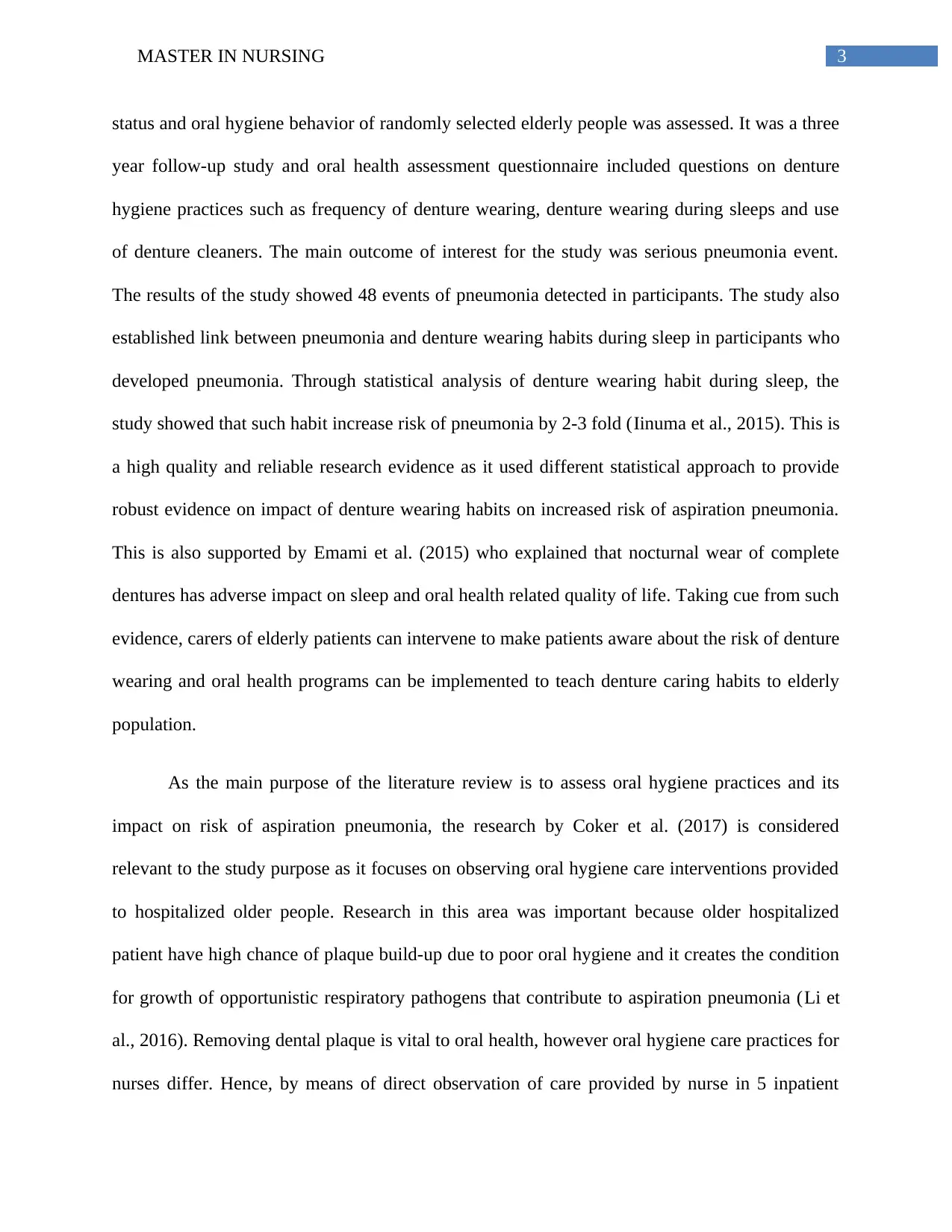
3MASTER IN NURSING
status and oral hygiene behavior of randomly selected elderly people was assessed. It was a three
year follow-up study and oral health assessment questionnaire included questions on denture
hygiene practices such as frequency of denture wearing, denture wearing during sleeps and use
of denture cleaners. The main outcome of interest for the study was serious pneumonia event.
The results of the study showed 48 events of pneumonia detected in participants. The study also
established link between pneumonia and denture wearing habits during sleep in participants who
developed pneumonia. Through statistical analysis of denture wearing habit during sleep, the
study showed that such habit increase risk of pneumonia by 2-3 fold (Iinuma et al., 2015). This is
a high quality and reliable research evidence as it used different statistical approach to provide
robust evidence on impact of denture wearing habits on increased risk of aspiration pneumonia.
This is also supported by Emami et al. (2015) who explained that nocturnal wear of complete
dentures has adverse impact on sleep and oral health related quality of life. Taking cue from such
evidence, carers of elderly patients can intervene to make patients aware about the risk of denture
wearing and oral health programs can be implemented to teach denture caring habits to elderly
population.
As the main purpose of the literature review is to assess oral hygiene practices and its
impact on risk of aspiration pneumonia, the research by Coker et al. (2017) is considered
relevant to the study purpose as it focuses on observing oral hygiene care interventions provided
to hospitalized older people. Research in this area was important because older hospitalized
patient have high chance of plaque build-up due to poor oral hygiene and it creates the condition
for growth of opportunistic respiratory pathogens that contribute to aspiration pneumonia (Li et
al., 2016). Removing dental plaque is vital to oral health, however oral hygiene care practices for
nurses differ. Hence, by means of direct observation of care provided by nurse in 5 inpatient
status and oral hygiene behavior of randomly selected elderly people was assessed. It was a three
year follow-up study and oral health assessment questionnaire included questions on denture
hygiene practices such as frequency of denture wearing, denture wearing during sleeps and use
of denture cleaners. The main outcome of interest for the study was serious pneumonia event.
The results of the study showed 48 events of pneumonia detected in participants. The study also
established link between pneumonia and denture wearing habits during sleep in participants who
developed pneumonia. Through statistical analysis of denture wearing habit during sleep, the
study showed that such habit increase risk of pneumonia by 2-3 fold (Iinuma et al., 2015). This is
a high quality and reliable research evidence as it used different statistical approach to provide
robust evidence on impact of denture wearing habits on increased risk of aspiration pneumonia.
This is also supported by Emami et al. (2015) who explained that nocturnal wear of complete
dentures has adverse impact on sleep and oral health related quality of life. Taking cue from such
evidence, carers of elderly patients can intervene to make patients aware about the risk of denture
wearing and oral health programs can be implemented to teach denture caring habits to elderly
population.
As the main purpose of the literature review is to assess oral hygiene practices and its
impact on risk of aspiration pneumonia, the research by Coker et al. (2017) is considered
relevant to the study purpose as it focuses on observing oral hygiene care interventions provided
to hospitalized older people. Research in this area was important because older hospitalized
patient have high chance of plaque build-up due to poor oral hygiene and it creates the condition
for growth of opportunistic respiratory pathogens that contribute to aspiration pneumonia (Li et
al., 2016). Removing dental plaque is vital to oral health, however oral hygiene care practices for
nurses differ. Hence, by means of direct observation of care provided by nurse in 5 inpatient
Paraphrase This Document
Need a fresh take? Get an instant paraphrase of this document with our AI Paraphraser
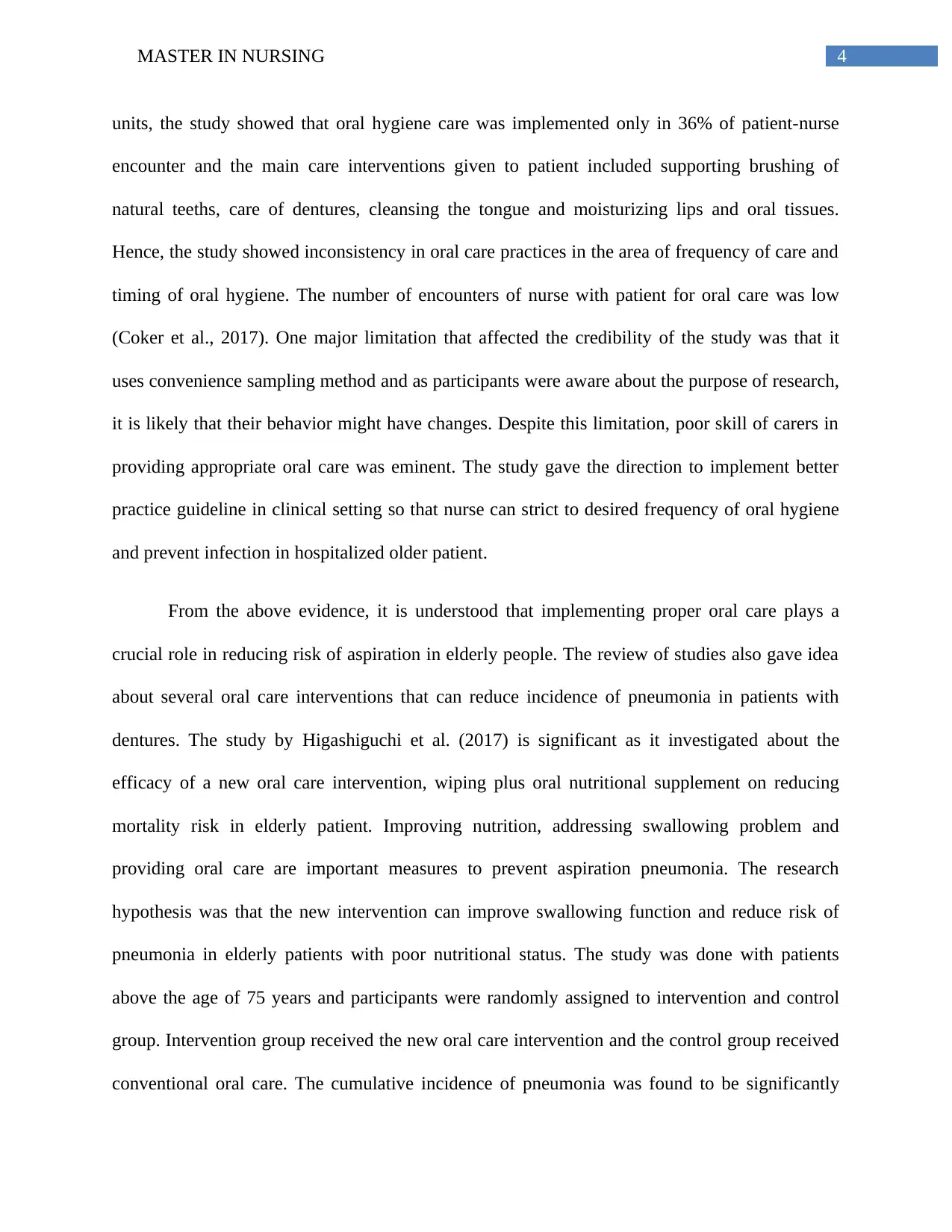
4MASTER IN NURSING
units, the study showed that oral hygiene care was implemented only in 36% of patient-nurse
encounter and the main care interventions given to patient included supporting brushing of
natural teeths, care of dentures, cleansing the tongue and moisturizing lips and oral tissues.
Hence, the study showed inconsistency in oral care practices in the area of frequency of care and
timing of oral hygiene. The number of encounters of nurse with patient for oral care was low
(Coker et al., 2017). One major limitation that affected the credibility of the study was that it
uses convenience sampling method and as participants were aware about the purpose of research,
it is likely that their behavior might have changes. Despite this limitation, poor skill of carers in
providing appropriate oral care was eminent. The study gave the direction to implement better
practice guideline in clinical setting so that nurse can strict to desired frequency of oral hygiene
and prevent infection in hospitalized older patient.
From the above evidence, it is understood that implementing proper oral care plays a
crucial role in reducing risk of aspiration in elderly people. The review of studies also gave idea
about several oral care interventions that can reduce incidence of pneumonia in patients with
dentures. The study by Higashiguchi et al. (2017) is significant as it investigated about the
efficacy of a new oral care intervention, wiping plus oral nutritional supplement on reducing
mortality risk in elderly patient. Improving nutrition, addressing swallowing problem and
providing oral care are important measures to prevent aspiration pneumonia. The research
hypothesis was that the new intervention can improve swallowing function and reduce risk of
pneumonia in elderly patients with poor nutritional status. The study was done with patients
above the age of 75 years and participants were randomly assigned to intervention and control
group. Intervention group received the new oral care intervention and the control group received
conventional oral care. The cumulative incidence of pneumonia was found to be significantly
units, the study showed that oral hygiene care was implemented only in 36% of patient-nurse
encounter and the main care interventions given to patient included supporting brushing of
natural teeths, care of dentures, cleansing the tongue and moisturizing lips and oral tissues.
Hence, the study showed inconsistency in oral care practices in the area of frequency of care and
timing of oral hygiene. The number of encounters of nurse with patient for oral care was low
(Coker et al., 2017). One major limitation that affected the credibility of the study was that it
uses convenience sampling method and as participants were aware about the purpose of research,
it is likely that their behavior might have changes. Despite this limitation, poor skill of carers in
providing appropriate oral care was eminent. The study gave the direction to implement better
practice guideline in clinical setting so that nurse can strict to desired frequency of oral hygiene
and prevent infection in hospitalized older patient.
From the above evidence, it is understood that implementing proper oral care plays a
crucial role in reducing risk of aspiration in elderly people. The review of studies also gave idea
about several oral care interventions that can reduce incidence of pneumonia in patients with
dentures. The study by Higashiguchi et al. (2017) is significant as it investigated about the
efficacy of a new oral care intervention, wiping plus oral nutritional supplement on reducing
mortality risk in elderly patient. Improving nutrition, addressing swallowing problem and
providing oral care are important measures to prevent aspiration pneumonia. The research
hypothesis was that the new intervention can improve swallowing function and reduce risk of
pneumonia in elderly patients with poor nutritional status. The study was done with patients
above the age of 75 years and participants were randomly assigned to intervention and control
group. Intervention group received the new oral care intervention and the control group received
conventional oral care. The cumulative incidence of pneumonia was found to be significantly
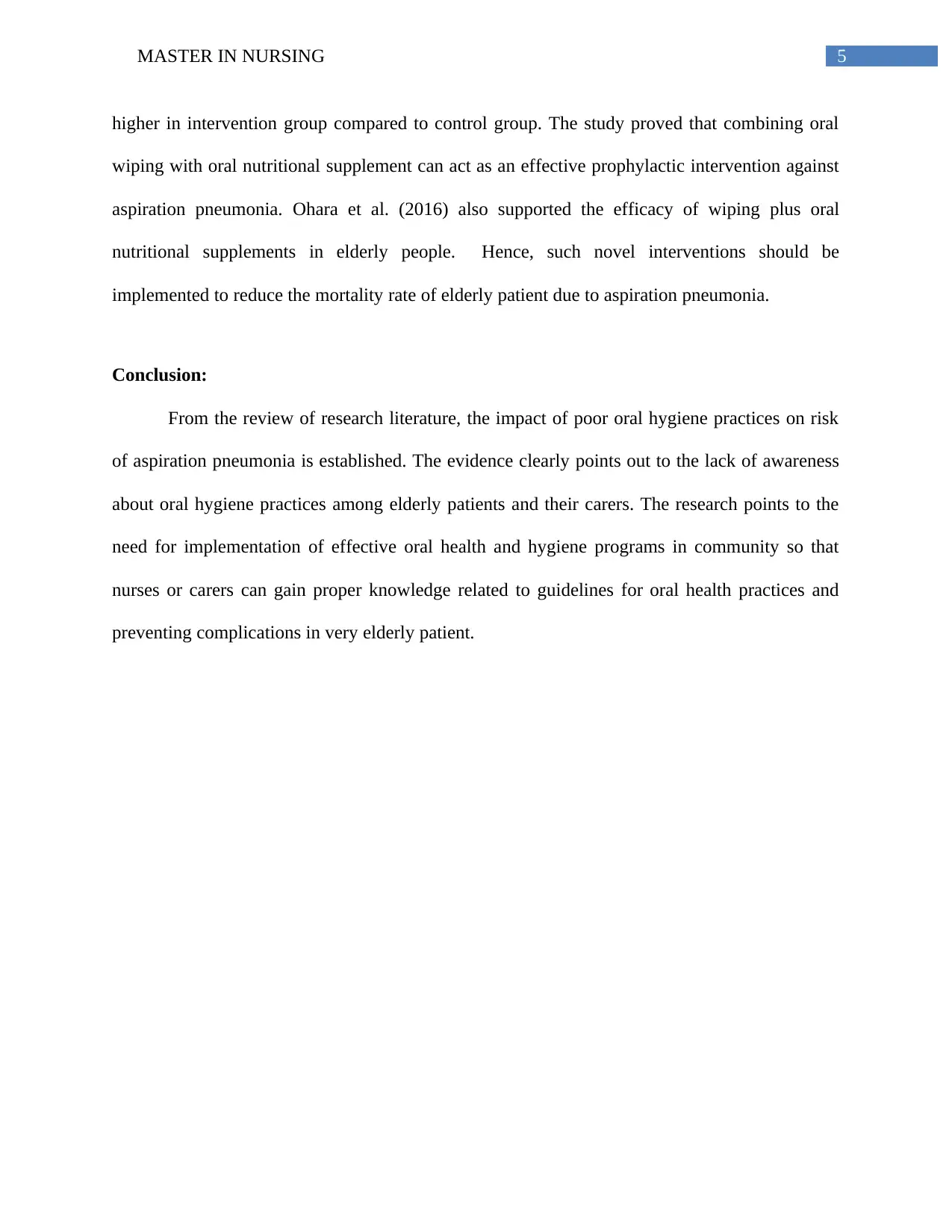
5MASTER IN NURSING
higher in intervention group compared to control group. The study proved that combining oral
wiping with oral nutritional supplement can act as an effective prophylactic intervention against
aspiration pneumonia. Ohara et al. (2016) also supported the efficacy of wiping plus oral
nutritional supplements in elderly people. Hence, such novel interventions should be
implemented to reduce the mortality rate of elderly patient due to aspiration pneumonia.
Conclusion:
From the review of research literature, the impact of poor oral hygiene practices on risk
of aspiration pneumonia is established. The evidence clearly points out to the lack of awareness
about oral hygiene practices among elderly patients and their carers. The research points to the
need for implementation of effective oral health and hygiene programs in community so that
nurses or carers can gain proper knowledge related to guidelines for oral health practices and
preventing complications in very elderly patient.
higher in intervention group compared to control group. The study proved that combining oral
wiping with oral nutritional supplement can act as an effective prophylactic intervention against
aspiration pneumonia. Ohara et al. (2016) also supported the efficacy of wiping plus oral
nutritional supplements in elderly people. Hence, such novel interventions should be
implemented to reduce the mortality rate of elderly patient due to aspiration pneumonia.
Conclusion:
From the review of research literature, the impact of poor oral hygiene practices on risk
of aspiration pneumonia is established. The evidence clearly points out to the lack of awareness
about oral hygiene practices among elderly patients and their carers. The research points to the
need for implementation of effective oral health and hygiene programs in community so that
nurses or carers can gain proper knowledge related to guidelines for oral health practices and
preventing complications in very elderly patient.
⊘ This is a preview!⊘
Do you want full access?
Subscribe today to unlock all pages.

Trusted by 1+ million students worldwide
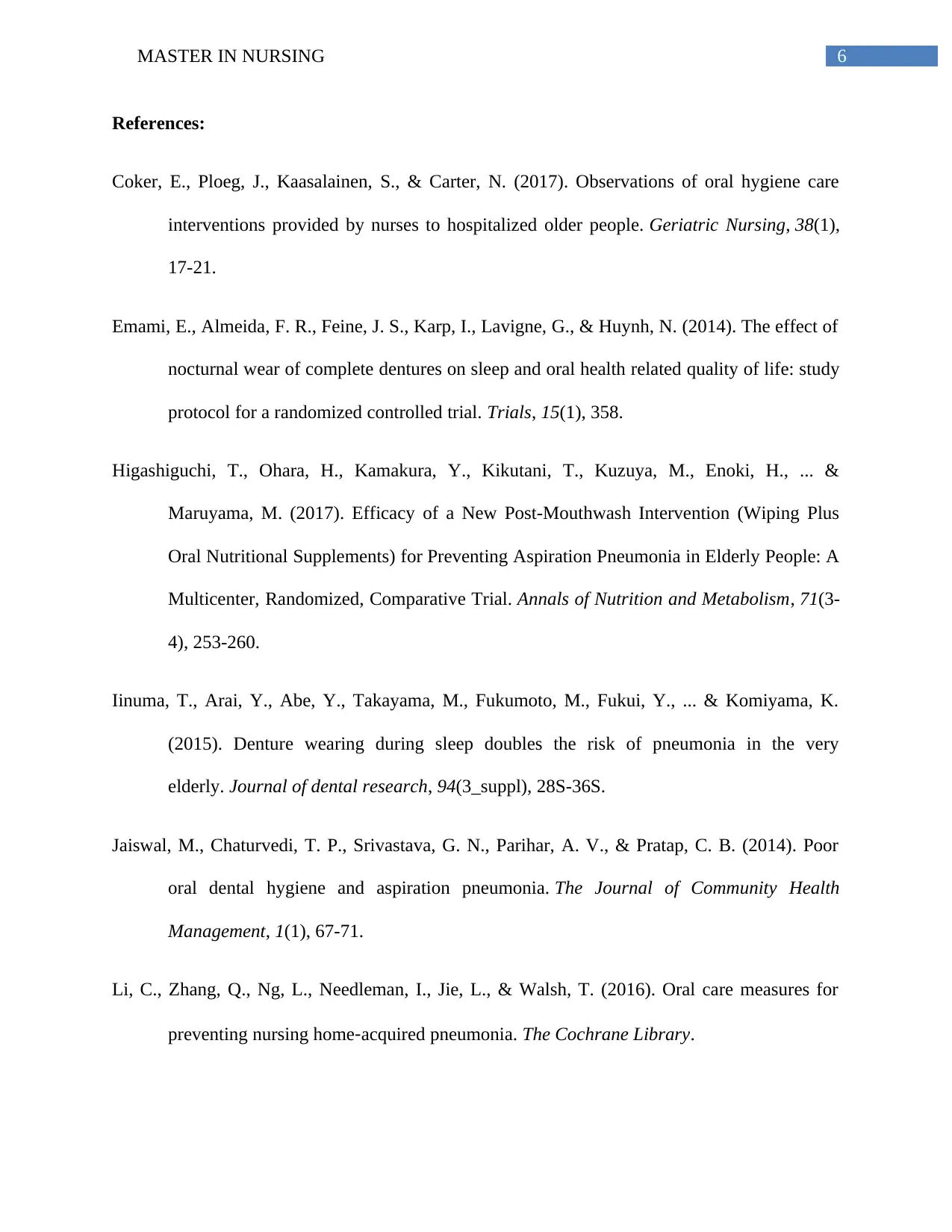
6MASTER IN NURSING
References:
Coker, E., Ploeg, J., Kaasalainen, S., & Carter, N. (2017). Observations of oral hygiene care
interventions provided by nurses to hospitalized older people. Geriatric Nursing, 38(1),
17-21.
Emami, E., Almeida, F. R., Feine, J. S., Karp, I., Lavigne, G., & Huynh, N. (2014). The effect of
nocturnal wear of complete dentures on sleep and oral health related quality of life: study
protocol for a randomized controlled trial. Trials, 15(1), 358.
Higashiguchi, T., Ohara, H., Kamakura, Y., Kikutani, T., Kuzuya, M., Enoki, H., ... &
Maruyama, M. (2017). Efficacy of a New Post-Mouthwash Intervention (Wiping Plus
Oral Nutritional Supplements) for Preventing Aspiration Pneumonia in Elderly People: A
Multicenter, Randomized, Comparative Trial. Annals of Nutrition and Metabolism, 71(3-
4), 253-260.
Iinuma, T., Arai, Y., Abe, Y., Takayama, M., Fukumoto, M., Fukui, Y., ... & Komiyama, K.
(2015). Denture wearing during sleep doubles the risk of pneumonia in the very
elderly. Journal of dental research, 94(3_suppl), 28S-36S.
Jaiswal, M., Chaturvedi, T. P., Srivastava, G. N., Parihar, A. V., & Pratap, C. B. (2014). Poor
oral dental hygiene and aspiration pneumonia. The Journal of Community Health
Management, 1(1), 67-71.
Li, C., Zhang, Q., Ng, L., Needleman, I., Jie, L., & Walsh, T. (2016). Oral care measures for
preventing nursing home‐acquired pneumonia. The Cochrane Library.
References:
Coker, E., Ploeg, J., Kaasalainen, S., & Carter, N. (2017). Observations of oral hygiene care
interventions provided by nurses to hospitalized older people. Geriatric Nursing, 38(1),
17-21.
Emami, E., Almeida, F. R., Feine, J. S., Karp, I., Lavigne, G., & Huynh, N. (2014). The effect of
nocturnal wear of complete dentures on sleep and oral health related quality of life: study
protocol for a randomized controlled trial. Trials, 15(1), 358.
Higashiguchi, T., Ohara, H., Kamakura, Y., Kikutani, T., Kuzuya, M., Enoki, H., ... &
Maruyama, M. (2017). Efficacy of a New Post-Mouthwash Intervention (Wiping Plus
Oral Nutritional Supplements) for Preventing Aspiration Pneumonia in Elderly People: A
Multicenter, Randomized, Comparative Trial. Annals of Nutrition and Metabolism, 71(3-
4), 253-260.
Iinuma, T., Arai, Y., Abe, Y., Takayama, M., Fukumoto, M., Fukui, Y., ... & Komiyama, K.
(2015). Denture wearing during sleep doubles the risk of pneumonia in the very
elderly. Journal of dental research, 94(3_suppl), 28S-36S.
Jaiswal, M., Chaturvedi, T. P., Srivastava, G. N., Parihar, A. V., & Pratap, C. B. (2014). Poor
oral dental hygiene and aspiration pneumonia. The Journal of Community Health
Management, 1(1), 67-71.
Li, C., Zhang, Q., Ng, L., Needleman, I., Jie, L., & Walsh, T. (2016). Oral care measures for
preventing nursing home‐acquired pneumonia. The Cochrane Library.
Paraphrase This Document
Need a fresh take? Get an instant paraphrase of this document with our AI Paraphraser
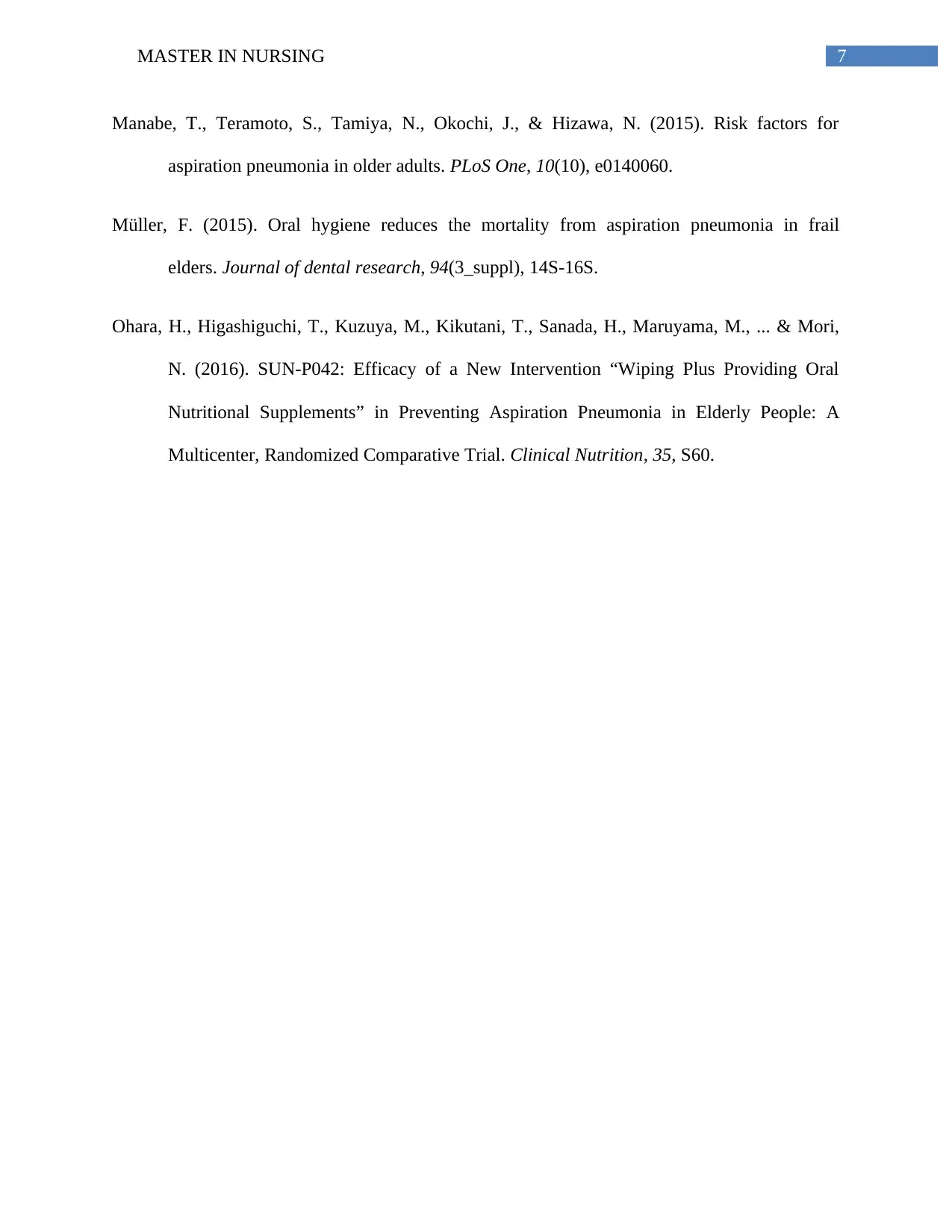
7MASTER IN NURSING
Manabe, T., Teramoto, S., Tamiya, N., Okochi, J., & Hizawa, N. (2015). Risk factors for
aspiration pneumonia in older adults. PLoS One, 10(10), e0140060.
Müller, F. (2015). Oral hygiene reduces the mortality from aspiration pneumonia in frail
elders. Journal of dental research, 94(3_suppl), 14S-16S.
Ohara, H., Higashiguchi, T., Kuzuya, M., Kikutani, T., Sanada, H., Maruyama, M., ... & Mori,
N. (2016). SUN-P042: Efficacy of a New Intervention “Wiping Plus Providing Oral
Nutritional Supplements” in Preventing Aspiration Pneumonia in Elderly People: A
Multicenter, Randomized Comparative Trial. Clinical Nutrition, 35, S60.
Manabe, T., Teramoto, S., Tamiya, N., Okochi, J., & Hizawa, N. (2015). Risk factors for
aspiration pneumonia in older adults. PLoS One, 10(10), e0140060.
Müller, F. (2015). Oral hygiene reduces the mortality from aspiration pneumonia in frail
elders. Journal of dental research, 94(3_suppl), 14S-16S.
Ohara, H., Higashiguchi, T., Kuzuya, M., Kikutani, T., Sanada, H., Maruyama, M., ... & Mori,
N. (2016). SUN-P042: Efficacy of a New Intervention “Wiping Plus Providing Oral
Nutritional Supplements” in Preventing Aspiration Pneumonia in Elderly People: A
Multicenter, Randomized Comparative Trial. Clinical Nutrition, 35, S60.
1 out of 8
Related Documents
Your All-in-One AI-Powered Toolkit for Academic Success.
+13062052269
info@desklib.com
Available 24*7 on WhatsApp / Email
![[object Object]](/_next/static/media/star-bottom.7253800d.svg)
Unlock your academic potential
Copyright © 2020–2026 A2Z Services. All Rights Reserved. Developed and managed by ZUCOL.





